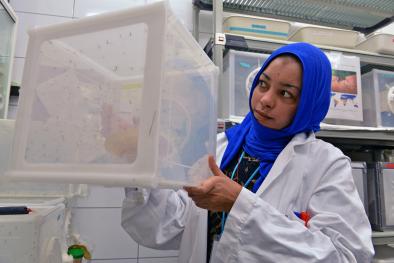Science Source
Zika Virus Infects Neural Progenitors in the Adult Mouse Brain and Alters Proliferation
This is the first study looking at the effect of Zika infection on the adult brain. Based on our findings, getting infected with Zika as an adult may not be as innocuous as people think.
Joseph Gleeson, adjunct professor at Rockefeller, head of the Laboratory of Pediatric Brain Disease, and Howard Hughes Medical Institute investigator
- Examines the potential for virus infection in the brain by screening serial coronal sections of whole brain from infected and mock-treated mice with the monoclonal 4G2 antibody that reacts with the flavivirus-specific family envelope protein
- Observes dramatic immunoreactivity in proximity to the SVZ of the anterior forebrain, as well as the SGZ of the hippocampus, the two regions in mouse that maintain stem cell populations throughout adulthood, in infected (but not mock-infected) mice
- Finds, in contrast, that there was less immunoreactivity in other regions of the brain under these conditions, suggesting a particular tropism of the virus for proliferative regions of the brain
- Assesses the impact of systemic ZIKV infection on cell proliferation in niches in adult brain using the thymidine analog EdU and a series of cell-cycle markers
- Results suggest that certain adult brain cells may be vulnerable to infection; among these are populations of cells that serve to replace lost or damaged neurons throughout adulthood, and are also thought to be critical to learning and memory
Related Content
Science Source
| The Lancet
El Niño and climate change—contributing factors in the dispersal of Zika virus in the Americas? - The Lancet
Shlomit Paz, Jan C Semenza
Science Source
| Proceedings of the National Academy of Sciences
Global risk model for vector-borne transmission of Zika virus reveals the role of El Niño 2015
Cyril Caminade, Joanne Turner, Soeren Metelmann et al
Headline

Apr 7, 2017 | Carbon Brief
Zika outbreak ‘fuelled by’ El Niño and climate change
Science Source
| MMWR. Morbidity and Mortality Weekly Report
Vital Signs: Update on Zika Virus–Associated Birth Defects and Evaluation of All U.S. Infants with Congenital Zika Virus Exposure — U.S. Zika Pregnancy Registry, 2016
Megan R. Reynolds, MPH; Abbey M. Jones, MPH; Emily E. Petersen et al


